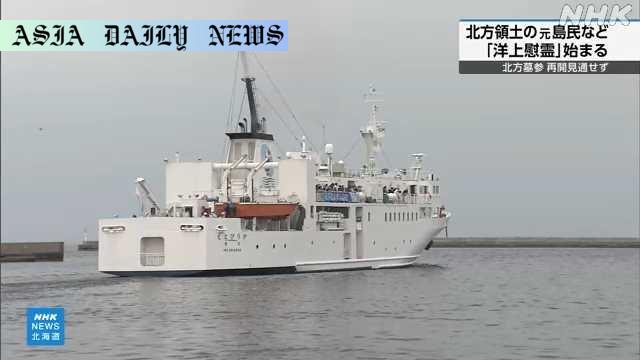Northern Territories: Former residents hold ocean memorial ceremonies to honor ancestors and advocate resumption of grave visits.
Key Point 1: Former residents of Japan’s Northern Territories honor their ancestors at sea due to restricted grave visits.
Key Point 2: The ongoing ceremony, first launched in 2022, aims to maintain cultural and familial ties despite geopolitical tensions.
Key Point 3: Organizers are planning additional ceremonies in 2023, advocating for reconciliation and eventual resumption of grave visits.

Honoring Ancestors Amid Political Disputes: A Traditions’ Resilience
The Northern Territories’ ex-residents embarked on a poignant journey to honor their ancestors amidst tumultuous geopolitical tensions. These islands, claimed by both Japan and Russia, have long been a source of contention. This specific memorial tradition at sea was initiated in 2022 to allow individuals to connect with their heritage despite restrictions caused by the Ukraine war and related diplomatic strains.
Among the attendees were former residents, their families, and other community members. They gathered on a specially constructed vessel, departing from Nemuro Port in Hokkaido with solemn purpose and reverence. Many of these attendees had yearned for a chance to pay homage to their ancestors directly on the islands but were left with no viable alternative due to geopolitical barriers. The ceremony seeks to convey respect and remembrance, fostering spiritual and cultural connections even under challenging circumstances.
A Long-Standing Geopolitical Dispute
The Northern Territories, known in Russia as the Southern Kurils, have faced disputes relating to sovereignty since World War Two. Japan asserts that post-war occupation of these lands by Russia was illegal, thus affirming its claim to the islands. This conflict, compounded by modern events like Russia’s ongoing invasion of Ukraine, has further strained bilateral relations, making any form of cooperation increasingly difficult.
Yet, traditions persist. These ceremonies represent unity among the displaced communities, many of whom have expressed a profound desire for reconciliation and a return to their ancestral grounds for grave visits. Organizers underline that these events aim to spark dialogue and potentially pave the way for negotiations that respect human and cultural ties over political complexities.
Future Ceremonies and Their Significance
In 2023, six more ocean memorial ceremonies have been planned. These will stretch across coasts near the Habomai Islands and Kunashiri Island. These initiatives, supported by the Hokkaido government and organizations representing the former residents, not only provide a sense of closure but also a small semblance of hope for a brighter future.
For many ex-residents, these ceremonies are more than just a remembrance tradition; they symbolize resilience, unity, and the pursuit of justice. As the world watches, these heartwarming acts of remembrance might act as catalysts for meaningful cross-border dialogue, proving that cultural and human goodwill have the strength to endure even the toughest political upheavals.



Commentary
Reflecting on the Northern Territories’ Memorials
The emotional toll faced by former residents of the Northern Territories reminds us how politics deeply impacts individual lives. The ongoing conflict over these islands, fueled by historical disputes and recent geopolitical events, has created not only political obstacles but also barriers to deeply personal and spiritual rituals.
The Value of Traditions Amidst Geopolitical Turmoil
The significance of these ocean ceremonies cannot be understated. They enable displaced communities to maintain their cultural identity and familial bonds despite physical separation from their ancestral land. It is a poignant example of human resilience and determination, as these individuals navigate loss and strive to preserve their traditions.
A Call for Diplomacy Through Heritage
As these ceremonies continue to draw attention, they also serve as reminders of the need for constructive dialogue between nations. Beyond political disputes lies a pressing need to consider the human stories impacted by these conflicts. By supporting traditions like these, we can hope to foster opportunities for compassion and cooperation in resolving some of the longstanding geopolitical crises.